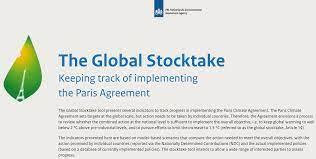
https://unfccc.int/topics/global-stocktake/about-the-global-stocktake/wh...
“The global stocktake is an ambition exercise. It’s an accountability exercise. It’s an acceleration exercise,” said UN Climate Change Executive Secretary Simon Stiell. “It’s an exercise that is intended to make sure every Party is holding up their end of the bargain, knows where they need to go next and how rapidly they need to move to fulfill the goals of the Paris Agreement.”
The global stocktake is a process for countries and stakeholders to see where they’re collectively making progress towards meeting the goals of the Paris Climate Change Agreement – and where they’re not.
It’s like taking inventory. It means looking at everything related to where the world stands on climate action and support, identifying the gaps, and working together to chart a better course forward to accelerate climate action.
The stocktake takes place every five years, with the first-ever stocktake scheduled to conclude at the UN Climate Change Conference (COP28) at the end of this year.
But this is not just a routine check-up. Stiell calls the stocktake a “moment for course correction,” an opportunity to ramp up ambition to avoid the worst consequences of climate change. The stocktake itself isn’t the gamechanger – it’s the global response to it that will make all the difference.
Stiell’s ideal outcome from the stocktake? A roadmap with ‘solutions pathways’ that drive immediate action. Pathways that guide us sector by sector, region by region, actor by actor, to get to where we need to go during the next seven years.
The global stocktake will end up being just another report unless governments and those that they represent can look at it and ultimately understand what it means for them and what they can and must do next. It’s the same for businesses, communities and other key stakeholders. - Simon Stiell, UN Climate Change Executive Secretary
Why is it so urgent?
The global stocktake is unfolding in a critical decade for climate action.
Global emissions need to be nearly halved by 2030 for the world to limit global temperature rise to 1.5 degrees Celsius. In addition, transformational adaptation is also needed to help communities and ecosystems cope with the climate impacts that are already occurring and are expected to intensify.
Every day, we see the devastating impacts of climate change, from raging wildfires to catastrophic floods to more frequent and intense heatwaves, as well as food and water scarcity, sea level rise, and biodiversity loss.
In March this year, the UN’s Intergovernmental Panel on Climate Change (IPCC) published its latest Synthesis Report, which summarizes all the scientific reports it has published during its sixth assessment cycle. This marked the first comprehensive IPCC report in nine years.
It highlighted just how far off-track the world is, reinforcing last year’s UN Climate Change report, which stated the combined climate pledges of 194 Parties under the Paris Agreement could put the world on track for around 2.5 degrees Celsius of warming by the end of the century.
The science is unequivocal: a course correction is needed. And it needs to happen now.
In order to keep 1.5 within reach we need deep and immediate emission cuts across all sectors and regions. We know what we have to do. Now we must boost political will to make that course correction through action and support possible. - Simon Stiell, UN Climate Change Executive Secretary
The IPCC Synthesis Report clearly demonstrates that it is possible to limit global warming to 1.5 degrees Celsius with feasible, effective and low-cost mitigation and adaptation options to scale up across sectors and countries. This report underscores the urgency of taking more ambitious action and shows that, if we act now, we can still secure a liveable, sustainable future for all.
The next few years will be critical in determining whether we can make the necessary changes in time to prevent the worst impacts of climate change.
The success of the global stocktake will ultimately determine the success of COP28. It is the defining moment of this year, this COP and — as one of the only two stocktaking moments in this decisive decade of climate action — ultimately pivotal to whether or not we meet our 2030 goals. - Simon Stiell, UN Climate Change Executive Secretary










Add new comment